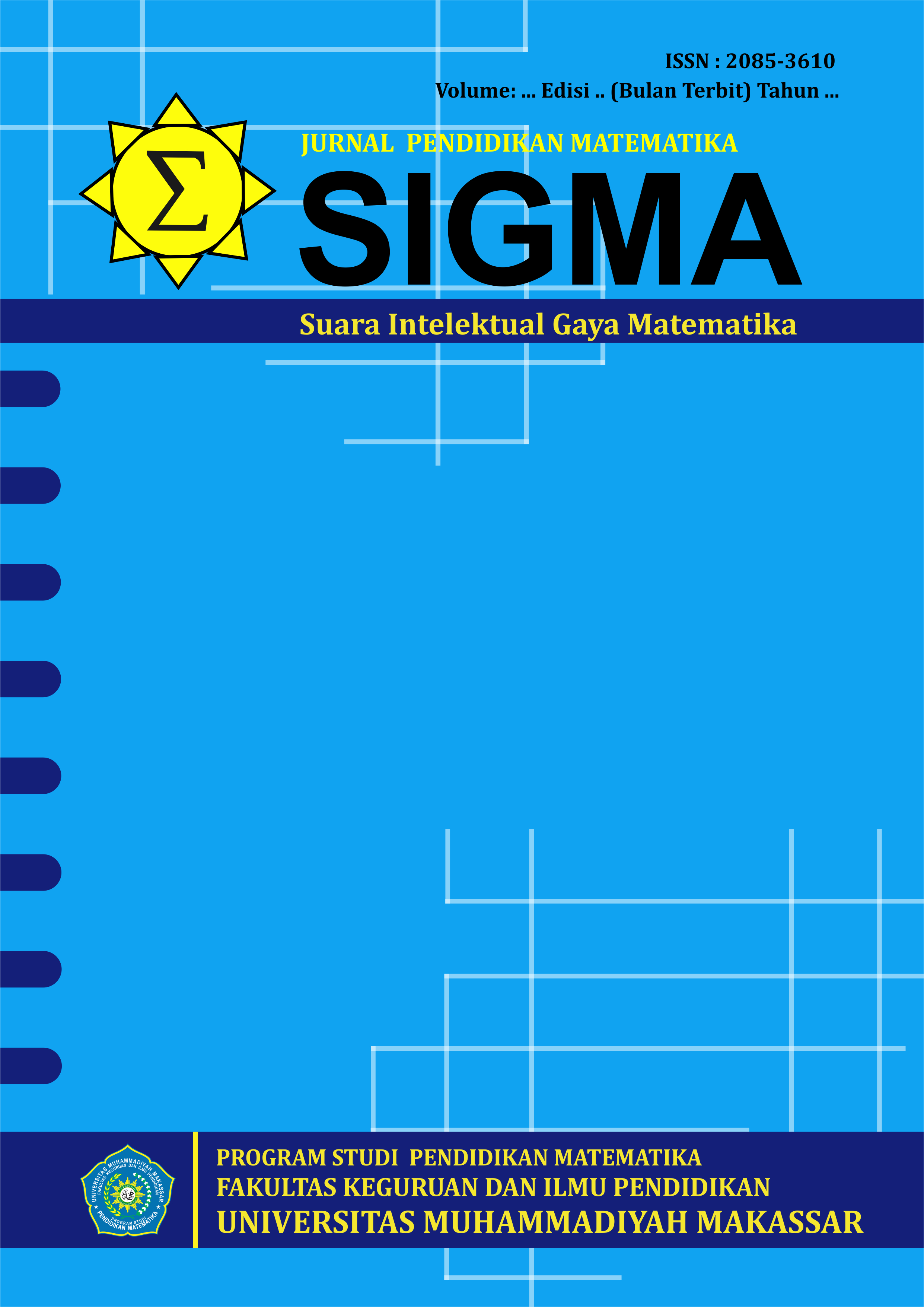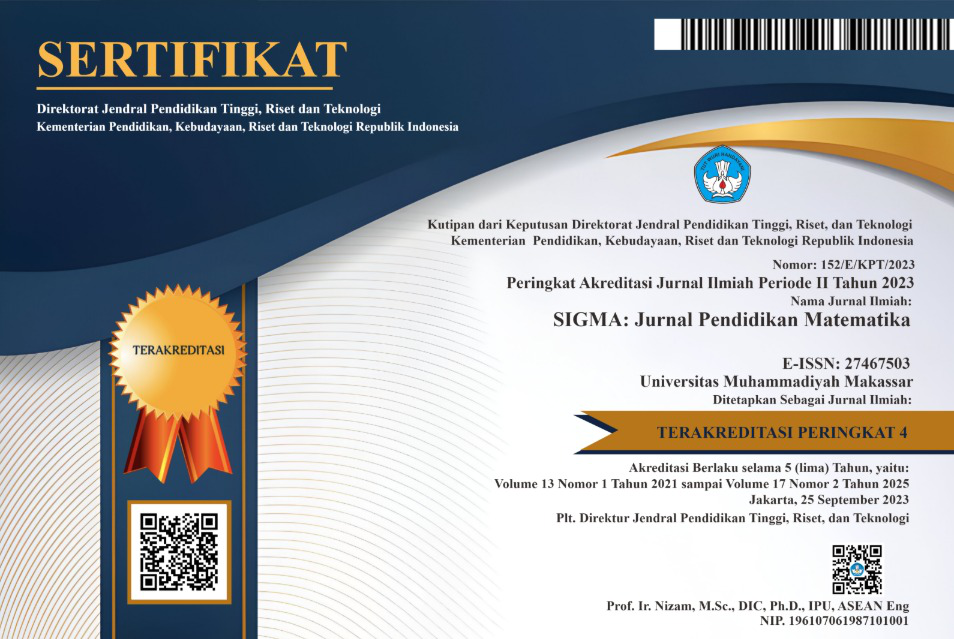NEED ANALYSIS IN DEVELOPING RME-BASED DIGITAL TEACHING MATERIALS OF MATHEMATICS FOR JUNIOR HIGH SCHOOL
DOI:
https://doi.org/10.26618/sigma.v16i2.15826Keywords:
developing, RME-based, digital teaching material, mathematics junior high school, need analysisAbstract
Needs analysis is the initial study in development research. This analysis is necessary to produce the right product. This study tries to find out whether digital teaching materials based on the RME approach on curved-face three-dimensional shapes materials need to be developed. The method used is descriptive research. Data were collected using a questionnaire. Technical analysis of data is done by processing and analyzing data using a Likert scale. The respondents in this study are 32 students and 5 mathematics teachers of a junior high school in Palembang. The data were collected using a questionnaire, observation, and interview. The data were analyzed descriptively. Based on the need analysis, it can be concluded that it is necessary to develop RME-based digital teaching materials. Digitalization is needed in learning in this era.
References
Aisa, A., & Lisvita, L. (2020). Penggunaan Teknologi Informasi dalam Pembelajaran Online Masa Covid-19. JoEMS (Journal of Education and Management), 3(4), 47-50. Retrieved from http://ojs.unwaha.ac.id/index.php/joems/article/view/308
Amie-Ogan, O. T., & Osuji, U. C. (2016). Availability and Utilization of Digital Instructional Materials in Public Senior Secondary in Port Harcourt Metropolis, Rivers State, Nigeria. International Journal of Academia, 2(1), 2.
Apriani, R., Harun, A. I., Erlina, E., Sahputra, R., & Ulfah, M. (2021). Pengembangan Modul Berbasis Multipel Representasi dengan Bantuan Teknologi Augmented Reality untuk Membantu Siswa Memahami Konsep Ikatan Kimia. JIPI (Jurnal IPA & Pembelajaran IPA), 5(4), 305-330. https://doi.org/10.24815/jipi.v5i4.23260
Beese, J. (2014). Expanding Learning Opportunities for High School Students with Distance Learning. American Journal of Distance Education, 28(4), 292 - 306.
Dowling, P. (2014). Recontextualization in Mathematics Education. In S. Lerman, Encyclopedia of Mathematics Education (pp. 525 - 529). Netherlands: Springer.
Febrianti, K. V., Bakri, F., & Nasbey, H. (2017). Pengembangan Modul Digital Fisika Berbasis Discovery Learning pada Pokok Bahasan Kinematika Gerak Lurus. WAPFI (Wahana Pendidikan Fisika), 2(2), 18 - 26.
Fonda, F., & Sumargiyani, S. (2018). The Developing Math Electronic Module with Scientific Approach Kvisoft Flipbook. Infinity Journal of Mathematics Education, 7(2), 109-122. https://doi.org/10.22460/infinity.v1i1.p1-9
Gaol, J. L., & Sinaga, S. (2020, September). Sosialisasi Disiplin Kerja dan Sikap Inovatif dengan Kinerja Guru SMA Negeri 14 Medan. Jurnal Pengabdian kepada Masyarakat Maju UDA, 25-30. Retrieved from https://jurnal.darmaagung.ac.id/index.php/pkmmajuuda/article/view/701
Halidi, H. M., Husain, S. N., & Saehana, S. (2015). Pengaruh Media Pembelajaran Berbasis TIK terhadap Motivasi dan Hasil Belajar IPA Siswa Kelas V SDN Model Terpadu Madani Palu. E-Jurnal Mitra Sains, 3(1), 53 - 60.
Harahap, E. P., Purba, A., D., Y., Sembiring, D. M., & Akhyaruddin, A. (2023, Desember). The Development of Teaching Materials for Reading Comprehension Using the Big Question Strategy for Indonesian Language and Literature Students. Al-Ishlah: Jurnal Pendidikan, 15(4), 5924-5936. https://doi.org/10.35445/alishlah.v15i4.3877
Heuvel-Panhuizen, M. V., & Drijvers, P. (2014). Realistic Mathematics Education. In S. Lerman, Encyclopedia of Mathematics Education (pp. 521 - 525). Netherlands: Springer.
Imansari, I., & Sunaryantiningsih, S. (2017). The Influence of the Use of Interactive E-Modules on Student Learning. Scientific Journal of Electrical Engineering Education, 2(2), 109-122.
Kusmana, S., Pujiatna, T., & Gloriani, Y. (2020). The Development of Fabel Text Teaching Materials Based on Local Wisdom as Learning Scaffolding. The 3rd International Conference on Language,Literature, and Education (ICLLE 2020). 3, pp. 328-336. Padang: Atlantis Press. https://doi.org/10.2991/assehr.k.201109.054
Leontyeva, I. A. (2018). Modern Distance Learning Technologies in Higher Education: Introduction Problems. Eurasia Journal of Mathematics, Science and Technology, 14(10), 1 - 8.
Lisana. (2015). Software Edukasi Matematika Berhitung Berbasis Permainan pada Anak Pra Sekolah. Seminar Nasional Inovasi dalam Desain dan Teknologi (pp. 241 - 248). Surabaya: Ubaya.
Lohr, A., Sailer, M., Stadler, M., & Fischer, F. (2024). Digital learning in schools: Which skills do teachers need, and who should bring their own devices? Teaching and Teacher Education, 4(2), 38-57. https://doi.org/10.1016/j.tate.2024.104788
Magdalena, I., Khofifah, A., & Auliyah, F. (2023). Bahan Ajar. Sindoro: Cendikia Pendidikan, 2(5), 10-20. https://doi.org/10.9644/scp.v1i1.332
Malichatin, H. (2019). Analisis Kemampuan Technological Pedagogical and Content Knowledge Mahasiswa Calon Guru Biologi Melalui Kegiatan Presentasi di Kelas. Journal of Biology Education, 2(2), 162-171. http://dx.doi.org/10.21043/jbe.v2i2.6352
Martha, Z. D., Adi, E. P., & Soepriyanto, Y. (2018). E-Book Berbasis Mobile Learning. Jurnal Kajian Teknologi Pendidikan, 1(2), 109 - 114.
Munzil, M., Affriyenni, Y., Mualifah, S., Fardhani, I., Fitriyah, I. J., & Muntholib, M. (2022). Development of Problem Based Learning Based e-Modules in the Form of Flipbooks on Environmentally Friendly Technology Materials as an Independent Learning Material for Students Especially Online Learning. Jurnal Pendidikan Sains Indonesia (Indonesian Journal of Science Education), 10(1), 37-46. https://doi.org/10.24815/jpsi. v10i1.21807
Pitriani. (2016). Problem Based Learning Berbantuan Cabri 3D untuk Meningkatkan Habit of Thinking Flexibly Siswa SMA. Nabla Dewantara: Jurnal Pendidikan Matematika, 1(2), 12 - 24.
Pitriani. (2018). Prestasi dan Kemandirian Belajar dalam Geometri Transformasi melalui Learning Cycle 5E Berbantuan Software. Desimal: Jurnal Matematika, 1(2), 229 - 235.
Prastowo, A. (2015). Panduan Kreatif Membuat Bahan Ajar Inovatif (Menciptakan Metode Pembelajaran yang Menarik dan Menyenangkan). Yogyakarta: Diva Press.
Putra, N., Yahya, M., & Nurbaiti, N. (2021). Revolusi Industri 4.0: Peran Teknologi dalam Eksistensi Penguasaan Bisnis dan Implementasinya. JPSB, 9(2), 91-98. https://doi.org/10.26486/jpsb.v9i2.2103
Rahmadani, H., Roza, Y., & Murni, A. (2018). Analisis Kebutuhan Bahan Ajar Matematika Berbasis Teknologi Informasi (TI) di SMA IT Al Bayyinah Pekanbaru. Juring (Journal for Research in Mathematics Learning), 1(1), 91 - 98.
Salamah, W. (2020). Deskripsi Penggunaan Aplikasi Google Classroom dalam Proses Pembelajaran. Jurnal Penelitian dan Pengembangan Pendidikan, 4(3), 533-538. https://doi.org/10.23887/jppp.v4i3.29099
Saluky. (2016). Pengembangan Bahan Ajar Matematika Berbasis Web Dengan Menggunakan Wordpress. EduMa, 5(1), 80 - 90.
Sari, Y. I., Wienanda, W. K., & Nugraheni, N. E. (2020). Need Analysis to Develop Teaching Materials at Vocational College UGM. Jurnal Pendidikan Vokasi, 10(2), 138-149. https://doi.org/10.21831/jpv.v10i2.27934
Sholihat, M. N., Koswara, U., & Irawan, D. (2024). Analisis Pemahaman Guru Matematika SMP terhadap Pembelajaran Berdiferensiasi dan Pemanfaatan Media Digital di Kabupaten Sumedang. SIGMA: Jurnal Pendidikan Matematika, 16(2), 500-512. https://doi.org/10.26618/sigma.v16i2.16329
Sidiq, R., Najuah, N., & Suhendro, P. (2021). Utilization of Interactive E-Modules in Formation of Students’s Independent. International Journal of Educational Research & Social Sciences, 2(6), 1651-1657. https://doi.org/10.51601/ijersc.v2i6.194
Smaldino, S. E., & Lowther, D. L. (2019). Instructional Technology & Media for Learning. Jakarta: Kencana.
Sumarni, Prayitno, A. T., & Nurpalah, M. (2017). Pengembangan Bahan Ajar Matematika Ekonomi Berbasis Learning Cycle Berbantuan Software Geogebra untuk Meningkatkan Hasil Belajar Mahasiswa. Jurnal Edukasi dan Sains Matematika (JES-MAT), 3(2), 139 - 154.
Suprihatin, S., & Manik, Y. M. (2020). Guru Menginovasi Bahan Ajar sebagai Langkah untuk Meningkatkan Hasil Belajar Siswa. Jurnal Promosi: Jurnal Pendidikan Ekonomi UM Metro, 8(1), 65-72. http://dx.doi.org/10.24127/pro.v8i1.2868
Winahyu, A. I. (2020, June 17). Kemendikbud Tegaskan Pembelajaran Jarak Jauh Tidak Harus Daring. Retrieved September 20, 2020, from Media Indonesia: https://mediaindonesia.com/read/detail/321229-kemendikbud-tegaskan-pembelajaran-jarak-jauh-tidak-harus-daring
Zulkardi, Putri, R. I., & Wijaya, A. (2020). Two Decades of Realistic Mathematics Education in Indonesia. International reflections on the Netherlands didactics of mathematics: Visions on and experiences with Realistic Mathematics Education, 325-340.
Downloads
Published
Issue
Section
License
With the receipt of the article by the SIGMA: Jurnal Pendidikan Matematika Editorial Board and the decision to be published, then the copyright regarding the article will be diverted to SIGMA: Jurnal Pendidikan Matematika.
Universitas Muhammadiyah Makassar as the publisher of SIGMA: Jurnal Pendidikan Matematika hold the copyright regarding all the published articles in this journal.Universitas Muhammadiyah Makassar has the right to multiply and distribute the article and every author is not allowed to publish the same article that was published in this journal.
The manuscript authentic and copyright statement submission can be downloaded ON THIS FORM.






